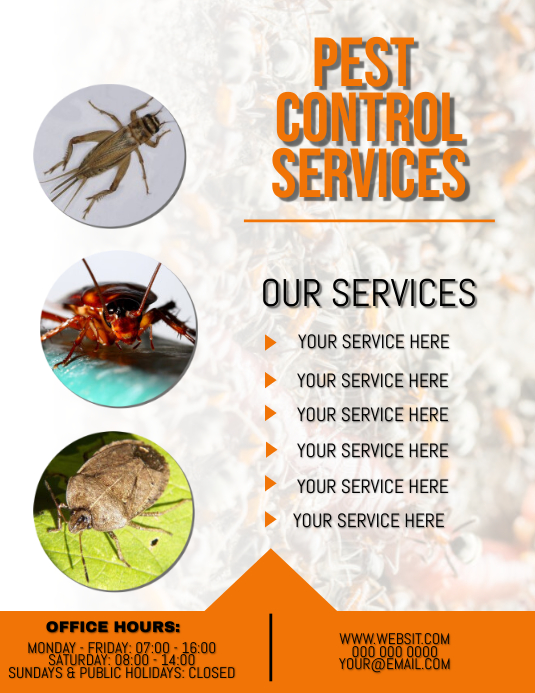Specialist Pest Control Auckland: Trusted Providers for Your Satisfaction
Wiki Article
Understanding Different Sorts Of Insect Control Approaches and Their Performance
The monitoring of bugs is a crucial aspect of maintaining the health and wellness and stability of different atmospheres, from agricultural fields to residential homes. When taking into consideration pest control approaches, it is vital to understand the diverse methods available and their differing levels of effectiveness. From chemical treatments to biological remedies, each technique provides distinct benefits and limitations. By checking out the nuances of these parasite control strategies, a comprehensive understanding of just how to resolve parasite concerns can be developed.Chemical Parasite Control Approaches
Chemical parasite control approaches play an essential function in effectively managing and eliminating pest infestations in different settings. One of the key benefits of chemical parasite control is its capability to offer fast and targeted services to pest troubles. Pest Control Auckland.However, it is vital to think about the prospective threats and disadvantages linked with chemical insect control methods. Overreliance on chemicals can bring about the development of pesticide resistance in insects, making them more difficult to regulate over time. In addition, making use of particular chemicals can have hazardous effects on non-target microorganisms, the environment, and human health otherwise used correctly.

Organic Bug Control Approaches
Using all-natural killers and virus to manage insect populaces successfully, biological pest control methods provide a environment-friendly and lasting method to pest monitoring. By presenting or promoting the activity of microorganisms that naturally take advantage of or infect pests, such as ladybugs for aphid control or certain bacteria for caterpillar problems, biological control can help preserve bug populaces at convenient degrees without the requirement for synthetic chemicals. This approach is especially helpful for natural farming methods, as it avoids using potentially harmful compounds while maintaining plant wellness.
Physical Parasite Control Techniques
While biological bug control approaches focus on taking advantage of all-natural predators and microorganisms, physical insect control approaches utilize mechanical and physical barriers to take care of insect populations. These techniques are often thought about eco-friendly as they decrease using chemicals. Physical parasite control consists of strategies such as capturing, utilizing barriers like internet or screens, and literally removing parasites from the area.Traps are frequently used in physical parasite control to catch and remove parasites like insects and browse this site rodents. One more physical approach is the use of obstacles such as screens, fences, or internet to stop pests from getting in or infesting specific areas.
Natural Parasite Control Techniques
Incorporating natural predators and plant-based repellents is a crucial approach in carrying out effective natural bug control approaches. By encouraging the presence of helpful pests like ladybugs, lacewings, or predacious mites, gardeners can naturally manage pest populations. These killers eat common garden bugs such as termites, caterpillars, and aphids, assisting to keep a well balanced environment without the demand for chemical interventions.
Furthermore, implementing cultural techniques such as plant rotation, companion planting, and preserving proper plant wellness can likewise boost the effectiveness of all-natural pest control methods. These strategies not only help in avoiding parasite infestations however likewise advertise biodiversity and overall community resilience. By integrating these natural methods, people can effectively manage parasites while reducing environmental effect.
Integrated Bug Administration (IPM) Strategy
Carrying Out an Integrated Pest Monitoring (IPM) method is crucial for successfully controlling parasite populaces while reducing dependence on chemical pesticides. IPM is a detailed and sustainable method that incorporates various parasite control techniques to attain long-lasting services. This strategy concentrates on control, avoidance, and surveillance to resolve insect problems in an eco-friendly fashion.IPM incorporates organic, cultural, physical, and mechanical strategies with the minimal and calculated usage of chemicals when necessary. By highlighting proactive steps such as environment image source alteration, biological control, and exemption, IPM intends to minimize insect populations and their influence on the ecological community. Regular tracking is critical in IPM to assess pest degrees precisely and determine the most suitable control approaches.
Among the essential advantages of IPM is its capacity to reduce the risks related to too much pesticide use, such as ecological contamination and harm to non-target organisms. In addition, IPM advertises a much more alternative technique to pest management by taking into consideration the general community dynamics. Overall, the IPM technique supplies a efficient and lasting option for bug control while promoting environmental obligation.
Conclusion
Finally, recognizing the different types of parasite control methods and their efficiency is crucial in properly handling insect infestations. Chemical, biological, physical, and all-natural parasite control methods each have their very own benefits and limitations. Integrated Insect Administration (IPM) method, which incorporates different approaches for lasting insect control, is increasingly being acknowledged as a environmentally friendly and all natural remedy. By making use useful source of a combination of these individuals, companies and techniques can successfully regulate bugs while reducing injury to the atmosphere.Chemical bug control techniques play a critical function in effectively taking care of and eliminating pest problems in various settings.Making use of all-natural killers and microorganisms to take care of bug populations properly, biological parasite control techniques offer a sustainable and eco-friendly strategy to pest administration. By presenting or promoting the activity of microorganisms that naturally prey on or contaminate pests, such as ladybugs for aphid control or certain microorganisms for caterpillar infestations, organic control can help preserve pest populations at convenient degrees without the demand for synthetic chemicals.While biological parasite control techniques concentrate on utilizing all-natural killers and microorganisms, physical insect control techniques make use of physical and mechanical barriers to handle pest populations. Integrated Bug Monitoring (IPM) approach, which integrates numerous approaches for sustainable parasite control, is increasingly being identified as a eco friendly and all natural service.
Report this wiki page